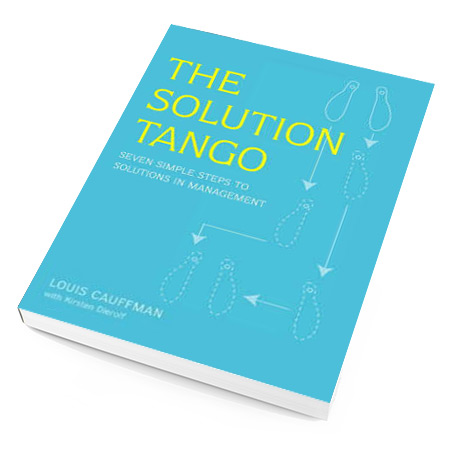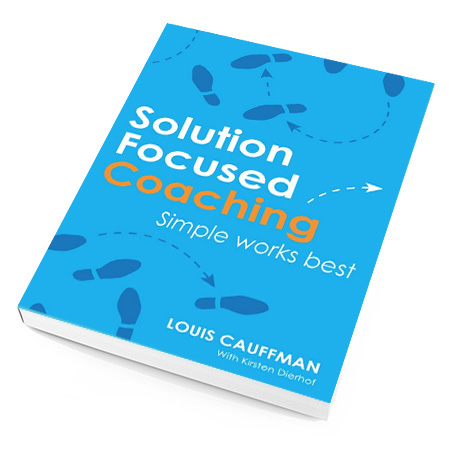Episode 8 – The Man in the Middle: A Solution Focused Feuilleton
Steve: “Good. Can I ask you a strange question? We’re sitting here talking in your office. Later we will both continue with our own work. Tonight, you’ll go home and spend a quiet evening doing whatever you do at home, and you’ll go to bed. While you are sleeping, suppose a miracle happens. You don’t know this miracle has happened because you are sleeping. In that miracle all your problems have been solved sufficiently that they don’t bother you any longer. Tomorrow morning you wake up. How would you know that this miracle happened? What would you do differently?”
Peter: “Well, that is a strange question. I don’t believe in miracles.”

Steve: “I don’t either, but let’s just pretend that miracles exist. What would be different?”
A little persistence comes in handy when asking the miracle question!
Peter: “Well, I would feel refreshed and hop out of bed. I wouldn’t fuss over work while I shave. Instead I would think about how I will spend the coming weekend with my two sons. During breakfast I wouldn’t listen to the news on the radio but put on some classical music. Instead of reading my newspaper, I would talk about bridge with my wife. Heck, talking about miracles, instead of taking the car I would cycle to work!”
Steve: “Great, go on. What would you do differently at work?”
Peter: “Instead of immediately locking myself in my office I would first walk around and talk to my staff. I would find out the latest news and gossip. Gee, I just realized that if a miracle had occurred, I would ask my secretary to pre-sort my mail for me. Instead of diving into the first dossier that I find on my desk, I would prepare my schedule for the day. Give myself some time to get organized. Then I would start to work on my mail while drinking coffee.”
Steve: “That’s excellent. What else?”
Peter: “Maybe I’d go to John’s office to say good morning — but believe me, Steve, that would be a real miracle.”
Steve: “Now that’s an excellent idea. What else?”
With supportive words like “great” and “excellent,” Steve confirms Peter’s useful ideas without trying to push him to actually do them. He allows Peter to continue speaking in the “as if a miracle happened” mode. This style of speaking helps to avoid resistance — it doesn’t have to happen, it could happen. Of course, it is obvious that some of the answers to the miracle question can become real options. Steve just has to endorse these possibilities. He particularly stresses that visiting John is a good idea.
Peter: “Furthermore, I would do the thing I do every day: work.”
Steve: “Wouldn’t something also have changed in your work? Will you do it in a slightly different way now that this miracle has occurred?”
Note that Steve now shifts from “would” to “will.”
Peter: “I don’t know. Maybe I would spend my day in a more relaxed manner, not as hurried and jumping from one matter to the next. I don’t know. Or maybe I do. Instead of running back and forth all day, I would take time to listen and talk to my staff.”
Peter has actually begun prescribing constructive behavior for himself! Without realizing it, he is gradually helping himself to move forward towards solutions.
It’s now time to involve others in the miracle.
Steve: “How will your colleagues know that this miracle happened? What will they see you do differently?”
Peter: “I don’t know for sure how they see me lately but it sure would be different. In the last months since the merger I have been grumbling more than in all the years before. They would probably see me more relaxed.”
Steve: “What else would they notice?”
Peter: “My secretary would be happy that I allow her to pre-sort my mail. She has suggested this over and over in the past. My employees will be content that I spend time with them again. Since our first meeting, I have been able to focus more on the planning of the dismantling project. Some of my people are real experts on this topic, and I started involving them in the planning. Let me think if there are other ways that they would notice the change. Yeah, of course, how could I forget? When they invited me for that drink last Monday evening, I immediately said yes. Actually, all these things are already happening for the better.”
Steve: “What would they be doing differently when the miracle has happened?”
Peter: “The most important change would be if the people from the old Solteam started to be less reserved with the newcomers and talked more openly with them. At the same time, the newcomers would act less self-sufficient and make more use of the experience that is in house by asking for information when they need it. Or to use the words of our HR manager, communication would be facilitated. (Giggles.) My department would come on track again if that happened.”
Steve: “Excellent, Peter. Interesting miracle! Are there elements from that miracle that you could try out in the next twenty-four hours?”
Now Peter is really surprised. It has never occurred to him that you can act out miracles! Steve just plants the idea in Peter’s mind without pushing him to do anything. Experience has taught Steve that pushing isn’t as effective as letting the other take the initiative. By simply asking this question, Steve suggests that Peter can try out some of the constructive things that he himself brought up. This has the power of a hypnotic suggestion. The beauty of it is that it is failsafe — if Peter gives it a try, it’s OK. If he doesn’t, it’s equally OK. Nothing can go wrong since it is Peter’s choice to do whatever he thinks is useful.
Steve: “Shall we take this a little step forward, Peter?”
Peter: “Yes please.”
“A little step forward” implies that some steps have already been taken). Steve guides the conversation in such a way that Peter has the impression that it is he who is setting the rhythm. This “leading from behind” is an elegant and powerful form of leadership that enhances cooperation.
(to be continued)
Read episode 9
Back to episode overview
‘The Man in the middle’ is an excerpt from the book ‘The Solution Tango’ (and ‘Solution Focused Coaching’ e-book) by Louis Cauffman. This book presents a new approach to conquering the numerous challenges, problems, and failures that managers encounter at work, many of which are people-related. An important lesson identified in the book is that a manager must act as both the leader who provides direction for a team or company and as the coach who enables others to make the most of their skills, enabling the individual and the organization to succeed. A seven-step framework to enhance problem-solving capabilities, examples and tips, and a survival kit for sinking managers will help managers improve their people skills and learn how to approach everyday issues from a positive perspective.
 LOUISCAUFFMAN.COM
LOUISCAUFFMAN.COM
